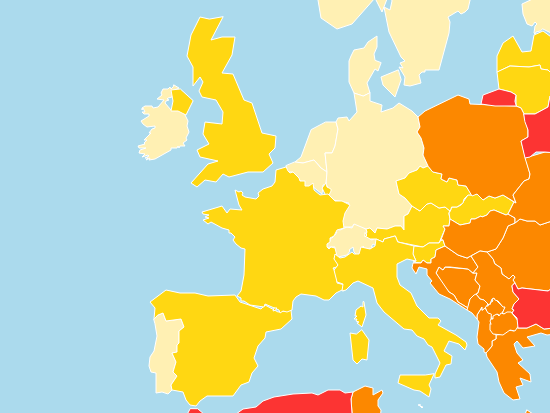
The UK has risen in the world press freedom rankings, but is still one of the “worst-performing countries in Western Europe”, researchers say.
Press freedom group Reporters without Borders (Reporters Sans Frontieres – RSF) has published its World Press Freedom Index for 2019, placing the UK at 33 out of 180 countries – a rise of seven places on last year.
The UK is now one spot below France and two spots above Slovakia – the country where investigative reporter Jan Kuciak was killed last year.
Speaking at an event to launch the 2018 index today, former Culture Secretary John Whittingdale said: “I am delighted the UK has moved up the index but nevertheless we should be a lot higher than we are.”
But Paris-based non-profit RSF said the UK’s rise was partly down to press freedom taking a nosedive in other countries.
RSF UK bureau director Rebecca Vincent said: “Although there have been improvements in some areas, unfortunately, part of the reason for the rise in the UK’s ranking is that the press freedom climate deteriorated so sharply in other countries.
“We should hold ourselves to a higher standard, and seek to be one of the best, not worst-performing countries in Western Europe.
“Too often steps taken in the name of national security trample press freedom, and too often legislation is adopted without adequate protection for journalists.
“Press freedom must be respected at the very core of domestic law, policies and practices, in line with the UK’s international human rights obligations.”
RSF raised concerns about trends in national security and data protection legislation that could impede on UK press freedom.
It specifically pushed for legal action against Northern Ireland journalists Barry McCaffrey and Trevor Birney to be dropped, while also condemning attempts to force back doors into encryption tools.
Of the case of McCaffrey and Birney, who currently remain on conditional bail, Whittingdale said: “It is a complicated case but it is a matter of concern if it is used or if it tarnishes the reputation of press freedom which this country should enjoy.”
But Vincent added that RSF was “encouraged” by the Foreign Office’s new international media freedom campaign and welcomed promises that Section 40 of the Crime and Courts Act would not be implemented.
Section 40 cost provision laws would see any news outlet not signed up to a Royal Charter-backed press regulator (currently only Impress) pay costs for both sides in legal battles, win or lose.
The Foreign Office appointed Amal Clooney as special envoy on media freedom earlier this month as part of its campaign, which aims to repeal “draconian” anti-press rules overseas.
Vincent said RSF hoped the FCO campaign would “result in greater vigilance of our own press freedom climate”.
Global press freedom rankings
While the UK rose in the press freedom rankings, the global story has not been quite so positive.
RSF warned that the number of countries where journalists could work with “complete security” continues to dwindle as anger at the press has “degenerated into violence”.
This year’s World Press Freedom Index recorded that 40 per cent of the 180 countries present “difficult” or “very serious” situations for journalists.
Authoritarian regimes such as Saudi Arabia, China and North Korea were listed at the bottom of the index.
RSF secretary-general Christophe Deloire said: “If the political debate slides surreptitiously or openly towards a civil war-style atmosphere, in which journalists are treated as scapegoats, then democracy is in great danger.
“Halting this cycle of fear and intimidation is a matter of the utmost urgency for all people of good will who value the freedoms acquired in the course of history.”
RSF added that violence toward journalists who anger authorities did not seem to “know any limits”, pointing to the killing of Saudi regime critic Jamal Khashoggi at a consulate in Istanbul last year.
The US, where five employees of regional newspaper Capital Gazette were shot last year, has fallen three places to 48th.
Speaking about the general picture around the world, and making a veiled reference to US President Donald Trump, Whittingdale said: “Media freedom is becoming particularly important in an era when there is a lot of what has been termed fake news around the world. There is a lot of disinformation, some of which is being state sponsored propaganda.
“There is a growing climate of hostility towards journalists, encouraged by some extremely irresponsible remarks from our leaders, I think you know who I mean but not just him. Every time a world leader attacks journalists to some extent it legitimises possibly even more serious violence against them.”
Kate Allen, director of Amnesty International UK, said in a statement: “Although the UK has made minor improvements in terms of press freedom, Amnesty International still has serious concerns about journalists being targeted for their work uncovering human rights abuses.
“The sinister arrest of journalists Trevor Birney and Barry McCaffrey – facing the prospect of serious charges simply for their vital work in uncovering police collusion in the Loughinisland massacre in Northern Ireland – leaves us in no doubt that press freedom in the UK remains at risk.
“Globally, journalists and media outlets are under increasing attack for their essential work. Concerted international effort is needed to ensure the safety of media workers, and we need to see those who harass or attack them brought to justice.”
Picture: RSF
Email pged@pressgazette.co.uk to point out mistakes, provide story tips or send in a letter for publication on our "Letters Page" blog
